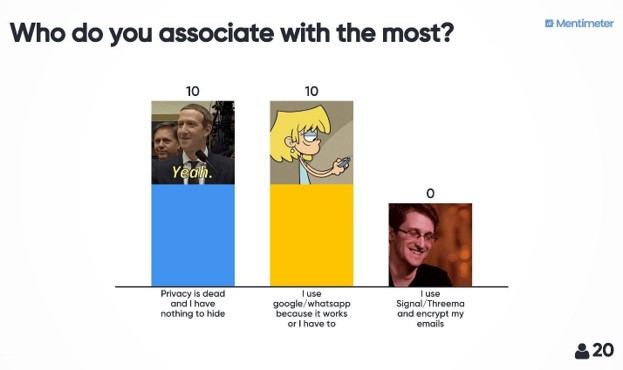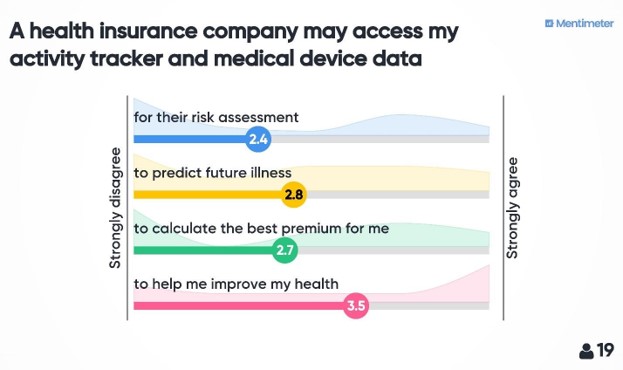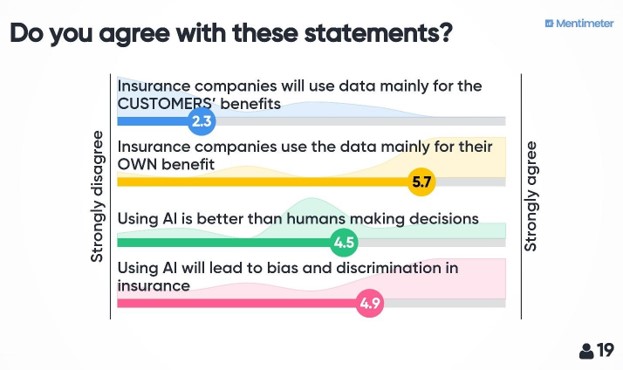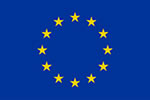INFINITECH at AI Symposium hosted by the University of Twente and Innovation Sprint
On 17th December 2019, the University of Twente, jointly with Innovation Sprint, organized a symposium on AI-driven Insights from Real World Data. The symposium consisted of several talks related to the question how AI can support traditional industries, such as Life Sciences, as well as Health, Wellbeing and Ageing (see the program here and a recap here).
One slot in the agenda was reserved for Research & Development pitches from Horizon 2020 projects, including INFINITECH. In a room full of researchers and clinicians interested in artificial intelligence and using real-world data, we wanted to take this opportunity to get an idea about their attitude. As Roessingh Research and Development is participating in INFINITECH Pilot #12: Real World Data for Novel Health-Insurance products, we were particularly interested in their attitude towards using real-world data for health insurance products. For this, we created a presentation using Mentimeter, an interactive presentation software that allows the audience to respond to questions.
Before Harm op den Akker presented ININITECH and the pilots, we tested the Mentimeter presentation with a question that also served as a fun ice breaker:

Interestingly, half of the audience identified with the “privacy is dead and I have nothing to hide” and the other half checked the option, that they use products like Google and WhatsApp because it works or they have to.
After this icebreaker question, Harm op den Akker presented the INFINITECH project, the different pilots and in particular the pilot on Personalized Usage Based Insurance Products. The aim of this pilot is to demonstrate how real-world data can be utilized for novel health-insurance products for the benefit of the insurer and the customers.
This short presentation was followed up by interactive Mentimeter slides, to learn more about the audience and their attitude towards this pilot. So, the first question was a word cloud with words that came to their mind after hearing about the project.

Words related to privacy (1984, privacy), data (data, big data, bid data, activity data), certain values (fairness, social inequality, health discrimination, control, value), as well as money (lots of money, so much money, premium, better prices, cost squeeze) came up quite often.
The next interactive slide was about their attitude towards a health insurance company using their personal data (from their activity tracker and medical devices). The options were a Likert scale with the options:

The audience seems slightly more positive towards the insurance accessing their data for the purpose of improving their health (weighted average 3.5), compared to predicting future illness (2.8), calculating the best premium (2.7), or using it for the health insurer’s risk assessment (2.4).
The last mini survey dealt with their attitudes towards the insurance companies’ motivation to use the data and the audience’s attitude towards using Artificial Intelligence in general. This was again a Likert scale, however this time some more options were given (not on purpose, but this explains the different values on the weighted averages):

Comparing the options of companies using it mainly for the customers vs. their own benefit, our audience leaned clearly towards assuming insurance companies would use it mainly for their own benefit. Nobody in the audience strongly agreed or agreed that insurance companies will use the data mainly for the customers’ benefits, and only one person strongly agreed the they use it mainly for their own benefit. Related to the use of AI in general, the audience seemed to be undecided on the statement whether AI is better than making decisions, but leaned more towards the statement that AI will lead to bias and discrimination. In the following pictures you can see the exact distributions of the votes to the last two questions.

The workshop presented here was a first taste of the stakeholder engagement activities in INFINITECH Pilot #12, and we are continuing to engage experts and potential users to make sure we are developing services that not only benefit the insurance sector, but also their wide base of users.
Christiane Grünloh & Harm op den Akker (Roessingh Research and Development)
